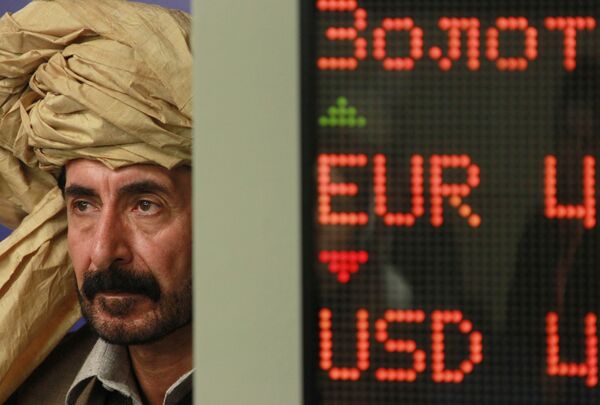A group of Afghan lawmakers urged Russia and other countries on Friday to step up efforts to maintain stability and tackle drug production in the war-town Central Asian state, warning of disaster after a U.S. troop pullout due by the end of 2014.
“Drug production is a very big threat to the entire international community, and it’s a shame for us,” Sayed Ishaq Gailani, a lawmaker from Afghanistan’s southeastern Paktika province and head of the Afghan National Solidarity Movement, said during a news conference in Moscow following a meeting with Russian lawmakers earlier this week.
The Afghan government, he said, “does not have an opportunity” to defeat drug trafficking on its own.
“We ask Russia and other countries to provide economic aid to help fight this evil,” he said.
Nadir Khan Katawazai, another Paktika representative in the Afghan parliament, suggested that the Russian authorities “take at least one province” where opium poppy is being cultivated “under their protection."
“I believe such an experiment would be very effective," he said.
When asked about Russia’s reaction to the proposal, a spokesman for the Russian Foreign Ministry said the issue was not in the ministry's competence. No one from the Russian Federal Drug Control Service was available for comment late on Friday afternoon.
As Afghan drug production skyrocketed since the U.S.-led invasion toppled the ruling Taliban movement in 2001, Russia has been one of the most affected countries, with 30,000-40,000 people being killed by drugs annually, official statistics show. Up to 80 tons of heroin – some 20 percent of the world's consumption – flow into Russia from Afghanistan every year via former Soviet Central Asian republics, according to UN estimates.
The cultivation of opium poppy, from which heroin is made, is a major source of income for many Afghan peasants, as well as for Taliban guerillas. Russia has helped fighting drug trafficking in Afghanistan by carrying out raids to destroy drug laboratories, providing experts and training Afghan anti-drug forces.
In December 2010, the head of Russia's drug-control agency, Viktor Ivanov, announced his plans to increase the number of agency representatives in Kabul.
But the Afghan lawmakers seem to believe those efforts are not enough. Gailani said more attention should be paid to local economy and agriculture in order to provide an “alternative” to Afghans involved in opium production.
“This problem cannot be solved by force,” Katawazai added.
Another Afghan lawmaker, Jahan Shah, complained of a “lack of international determination” to crackdown on Afghan drug mafia.
The Afghan lawmakers also suggested that Russia could help Afghanistan recover from decades of war by reconstructing infrastructure, energy and other facilities built in the country by Soviet engineers. Russia previously said it was ready to consider the issue.
Katawazai also said he had asked his Russian colleagues to persuade the country’s businessmen to invest in Afghanistan. But they did not show much enthusiasm for the idea, citing that U.S. troops withdrawal will make Afghanistan an even more dangerous place that it is now, he said.
In line with U.S. President Barack Obama’s plans, all U.S. combat troops should leave Afghanistan by the end of 2014, leaving the Afghan Army and police to maintain security in the country on their own.
Afghans ‘ready for cooperation’
The Moscow visit took place ahead of an international conference on Afghanistan to be hosted by Germany on December 5. Afghan President Hamid Karzai will preside over the talks, which will also involve Russian Foreign Minister Sergei Lavrov and U.S. Secretary of State Hillary Clinton, as well as representatives of some 90 other countries and organizations.
Admitting the need for national reconciliation to end the long-standing war in Afghanistan, German Chancellor Angela Merkel said in an interview with the General-Anzeiger newspaper from Bonn that moderate Taliban could contribute to the Afghan peace process if they cut all ties to al Qaeda and renounce violence.
Gailani said on Friday that “three very important Taliban figures” would take part in the Bonn conference. He did not name those delegates.
The conference will come a few days after a traditional assembly of Afghan tribal elders and other community leaders, Loya Jirga, endorsed a strategic cooperation agreement between the US and Afghanistan. In a 76-article declaration, the participants in the 2,000-member assembly supported the creation of U.S. bases in the country for a decade.
Katawazai said on Friday he and his fellow lawmakers would like strategic cooperation agreements to be signed with other countries, as well.
“We have a very gloomy experience of Soviet withdrawal,” he said, adding: “We are afraid that after 2014, our security forces will not be able to ensure security.”
The Soviet Union waged a war against Afghan insurgents in 1979-1989. The withdrawal of Soviet troops in February 1989 brought no peace to the troubled country, leading to renewed fighting between rival mujahedin groups for control of Kabul during the early 1990s.
Lawmaker Rona Tarin, one of some 20 women in the Afghan parliament's 102-strong upper house, said “Afghan people do not want Afghanistan to become a military foothold against other countries.”
On the contrary, she said, “Afghans are always ready for cooperation with regional states.”
Meanwhile, Afghanistan's neighbor Pakistan, which has long been a safe haven for Taliban militants, has said it will boycott the Bonn conference following a NATO air strike last Saturday that killed 24 Pakistani troops at the country’s border with Afghanistan. Islamabad’s absence from the talks is seen as a significant setback for international peace efforts in Afghanistan.




